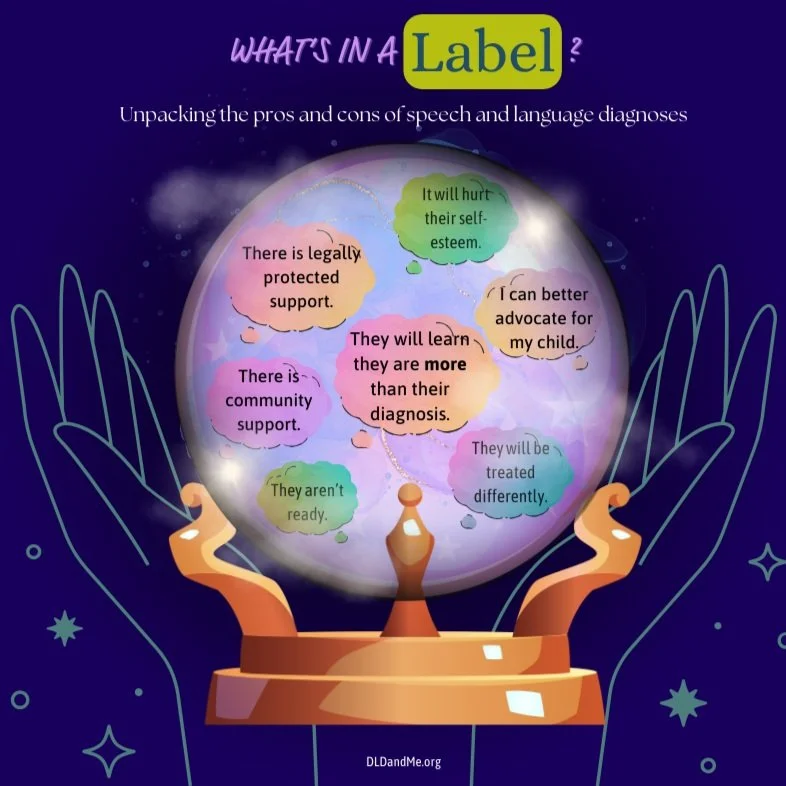What’s in a Label?: Unpacking the pros and cons of speech and language diagnoses
Parenting can be one of the greatest joys in life, but the weight of making decisions for our children can feel daunting. When faced with hard choices, you may wish for a crystal ball to show the best path forward.
When parents have concerns about their child’s language, communication, and learning development, deciding to seek an evaluation and diagnosis can be difficult. Here we explore these concerns and consider the potential benefits of diagnosis. We will draw not only from research on Developmental Language Disorder (DLD) but also stuttering and autism. These are all neurodevelopmental conditions that develop in childhood, yet they are often researched in silos. Research on the pros and cons of obtaining a DLD diagnosis in childhood is only emerging. Nevertheless, we can gain perspective from related literatures on what might be good or not so good about seeking and accepting diagnoses for our children.
The Potential Concerns of Seeking Diagnosis
It is common for parents to have worries about obtaining a neurodevelopmental diagnosis for their child. You may feel that your child isn’t ready to learn they may be different from some of their peers. You may fear that obtaining a label will invite mistreatment and stereotyping. You may worry that your child will develop low self-esteem because of the label.
These concerns are valid. Yet, we unfortunately cannot protect our children from labels even if we try our best. If they are not labeled as having DLD, other undesired labels may be imposed. People might use labels like ‘lazy’ or ‘trouble-maker’ because they falsely assume that the child is unmotivated or noncompliant.
The Potential Benefits of Seeking Diagnosis
You may find it reassuring to know that there is a growing body of research documenting benefits of early diagnosis. For example, people who learn about their autism diagnosis early in life tend to report higher quality of life and wellbeing than people who learn about their diagnosis later in life. Below are some reasons why obtaining a diagnosis is beneficial:
In the United States, identifying DLD in childhood provides clear, legally protected, formal pathways for support. The process for getting evidence-based, effective support for DLD becomes murkier in adulthood.
Children without a diagnosis may come to their own distorted conclusions about why they struggle with language. They might decide that they are not as smart as their peers. They may cope with their challenges in ways that are not helpful, such as trying to hide their struggles or withdrawing. Parents report that children who hide their DLD become exhausted and irritable.
Having a term for what they are experiencing opens doors for conversations at home. Talking about DLD at home does not have to be a one-time, fear-filled discussion. The conversation can continue and become more nuanced as your child grows. By talking about DLD, you can help your child to understand DLD as a neutral or unique part of who they are.
When children have a label of DLD, they can find community and support with other children who share their experience. Community can help them come to know they are not alone and that other “really cool kids” can sometimes have a hard time when it comes to language.
Having a diagnosis can lead you, the parent, to a better understanding of your child and the challenges they face. You can find information. You can explain your child’s challenges to teachers and family members. You can advocate for your child.
Unfortunately, there is no Magic 8 ball when it comes to making difficult decisions on behalf of our children. But we hope that this post can help you to make an informed decision.
References Hobson, H. M., & Lee, A. (2022). Camouflaging in Developmental Language Disorder: The views of speech and language pathologists and parents. Communication Disorders Quarterly, https://doi.org/10.1177/15257401221120937 .
Huws, J. C., & Jones, R. S. (2008). Diagnosis, disclosure, and having autism: An interpretative phenomenological analysis of the perceptions of young people with autism. Journal of Intellectual and Developmental Disability, 33(2), 99-107.
Oredipe, T., Kofner, B., Riccio, A., Cage, E., Vincent, J., Kapp, S. K., ... & Gillespie-Lynch, K. (2022). Does learning you are autistic at a younger age lead to better adult outcomes? A participatory exploration of the perspectives of autistic university students. Autism, 13623613221086700.
Smith-Demers, A. D. (2018). The elephant in the room: The lived experience of talking to children with ASD about their diagnosis. (Unpublished doctoral thesis). University of Calgary, Calgary, AB. doi:10.11575/PRISM/32049 http://hdl.handle.net/1880/106827
Tighe, J. M., & Namazi, M. (2022). SPICES: Disclosure practices to help caregivers digest a diagnosis of Developmental Language Disorder. American Journal of Speech-Language Pathology, 1- 14. https://doi.org/10.1044/2022_AJSLP-21-00295




